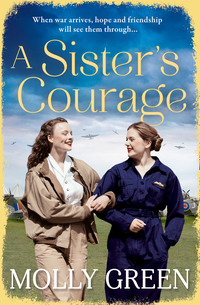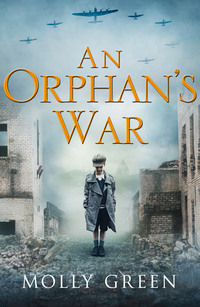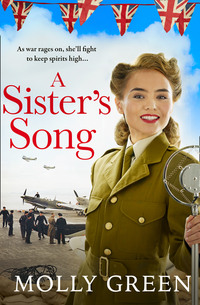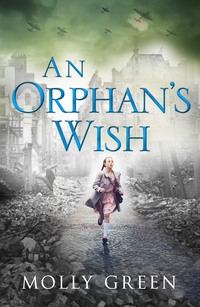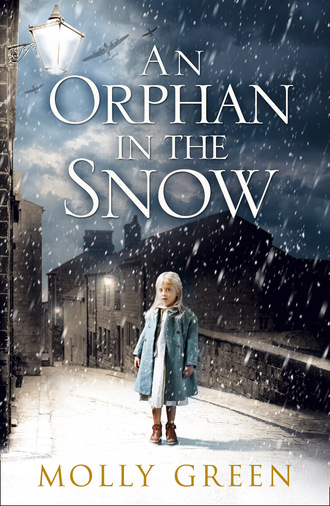
Полная версия
An Orphan in the Snow
‘I must get on,’ Matron said over her shoulder. ‘I’ve got paperwork to do so perhaps you can get one of the others to finish showing you around.’
June chewed her lip as she gazed after the unbending figure. She had a horrible feeling Matron wasn’t going to take any notice of her experience as a nursery nurse. She was the kind of woman who knew best, that was plain to see, and wasn’t interested in anyone else’s suggestions.
She felt bad thinking such things when she’d only just arrived but Matron certainly didn’t put herself out to make people feel at ease. June was determined she wasn’t going to make an enemy of her. That would be fatal. She squared her shoulders and began her tentative exploration of this mansion she must now call home.
Chapter Three
No one took the slightest bit of notice of June as she opened all the doors on the ground floor, taking note of the common room, the dining room, the cloakrooms, and a few steps down to the laundry room, where she could just make out two figures who were plunging what looked like poles into two enormous copper boilers and giggling through the steam. One of them looked up, sweat pouring off her forehead, and waved. There was also a playroom and a grand library. She had a few minutes’ quiet browse around the shelves, looking over her shoulder every so often in case she was spotted and reprimanded. What a luxury if she was allowed to borrow a book now and again, although most of these seemed very highbrow. She couldn’t see any novels, for one thing. At home she’d built up a small collection of books but she’d had to leave them behind when she went to London, and her room here felt bare without them. They’d been her friends when she’d had no one else. She shook herself. Mustn’t think.…
She climbed the main staircase and looked into the bedrooms. There were five large rooms, laid out like dormitories, containing eight identical narrow beds with a small locker next to each one. And near the door there was a larger single bed, she guessed for one of the adults to keep an eye on the children. Everywhere was clean and neat. Nothing out of place. It didn’t look as though any children lived here.
She thought of the state of her childhood home. Before she’d left at 16 to train as a nursery nurse, it had been chaos. Stella had already left home three years before to get married and move to Wisbech, leaving June with their violent father and a drunken mother. A mother who when Clara died had only found solace in drink, and as a consequence had neglected the home. June had done her best to keep everything going but it was almost a relief when her mother drifted into a coma one sunny morning in her bed. A once attractive woman lay on the pillow, her mouth open, her eyes wild, looking haggard and beaten before she gasped her last breath. June swallowed hard as the memories reached out to pull her back in – forcing her to relive it as she had already done, over and over, hundreds, maybe thousands of times, since it had happened. She’d been left with her father, an unkempt bully of a man, with a temper which erupted at any moment. He’d had not a shred of decency or compassion for comforting his grieving wife after Clara’s death.
The only time June had seen any sign of distress in him was after her mother’s funeral when June told him she was leaving home and going to live with Aunt Ada. He’d realised with a jolt of fear there was no one left to look after him. June’s lip curled in disgust, willing the old images to stop replaying. But they were too strong.
June had flown down the stairs to where Clara lay crumpled at the bottom. She cradled her sister’s head in her arms. Clara’s eyes were wide with terror. Thank God she was still alive.
‘Clara, darling, I’m here. You’re going to be all right.’
Clara smiled – an angel’s smile. Her eyes held a wise expression and June felt her heart sing with joy that her sister would indeed recover. She smiled back at her.
And then June heard a long sigh escape Clara’s lips as her head lolled to one side.
Clara had just had her eighth birthday.
As long as June lived she would never, ever forgive her father. And one day she would see that justice was done.
Tears fell from June’s eyes as she pulled the dormitory door shut. Would she ever stop reliving that nightmare? She brushed the tears away with the back of her hand, hoping against hope that no one would spot her and ask what was the matter. She could never tell anyone.
A bell sounded.
She heard footsteps behind her and spun round to see Iris.
‘I came to see how you were getting on. If I could answer any questions.’ Iris looked at her sharply. ‘You’ve been crying. Are you all right?’
‘Yes. I’m all right.’
Iris didn’t look convinced. ‘By the way, that was the bell for dinner. Are you hungry?’
‘Starving,’ June said, thankful the subject of her crying was closed. She followed Iris back into the hall. A noise like thunder crashed over her head and seconds later a stream of children came flying down the stairs, pushing and shoving and calling out.
‘Where on earth’s Matron?’ Iris sounded irritated as she glanced about her.
‘I’m here.’ Matron appeared from one of the oak doorways. ‘Right, children.’ She clapped her hands loudly and they immediately stopped their noise. ‘Before you go in, I want you all to know Miss Lavender is going to help keep you lot in line.’
‘Hello, Miss. You came in our class,’ a boy of about ten with a cheeky grin shouted over the banister. ‘Have you got any sweets for us?’
‘You’re not allowed sweets,’ Matron told him. ‘Now come on down, all of you, and line up, so Miss Lavender can take a look at you all … and keep your traps shut for once.’
June flinched. This was not the sort of language she ever used to keep children in order, but she knew she mustn’t make a comment – not yet. The children lined up, still shuffling and muttering, but they were obviously in awe of Matron as they’d quietened right down.
‘Can you all tell me your names and how old you are?’ June said, smiling at the first child and letting it travel along the row until it fell on the last. ‘I shan’t remember them all right away but I’ll do my best, and I’m sure you’ll remind me.’
‘You can do that after we’ve had dinner,’ Matron interrupted, clapping her hands again. ‘It’ll be cold at this rate. File in, all of you.’
‘I’m worried about the little girl, Lizzie,’ June whispered to Iris. ‘Matron said she has her meals in the nursery.’
‘I don’t agree with it at all,’ Iris said under her breath, ‘but Matron says she’s a disruptive influence over the other children.’
‘What did she do that’s disruptive?’
‘When she first came they put her in the dining room with all the other kids,’ Iris explained, ‘but if one of the teachers told her she had to eat what was on her plate and she didn’t like it, she’d throw the plate on the floor.’ Iris smiled ruefully. ‘We lost a lot of plates that week. Matron got angry and said Lizzie had to have her meals in the nursery from now on.’
‘But she’ll never learn to behave if she’s taken out of a normal situation like eating with the others,’ June protested.
‘I said as much to Matron but she ignored me. Matron is always right. You’ll soon find that out – if you can put up with it.’
June knew that Iris was warning her that she might not be able to put up with it; that Iris wouldn’t be at all surprised if she left. June pressed her mouth tight, resolving that it would take a lot more than that for her to give in her notice. In her experience Lizzie needed to know she was part of the home, whether she was naughty or good, and mix with the other children. June was sure it was the only way to encourage her to speak.
‘You’ll have to help serve at that table over there,’ Iris said, pointing, ‘and I’ll take this one. Don’t know where Kathleen’s got to – she’s the other nurse.’
‘Oh, yes, I met her in the sick bay.’
‘Of course. She takes the third table … oh, here she is.’
Kathleen shot in and gave Iris a wave, smiled at June, then rushed to her place, and the dining room became a crescendo of noise again until Matron appeared and banged on the table.
‘Fold your hands together for Grace,’ she said, raising her chin, her eyes rolling back in their sockets, her hands clasped, as though she were in direct contact with God. ‘For what we are about to receive, may the Lord make us truly thankful. Amen.’
‘Amen,’ repeated the children.
There was a clatter of plates and cutlery as two kitchen maids brought in the steaming bowls of stew and potatoes. When June had served all sixteen boys at her table, there was another kind of noise – slurping, gulping, hiccupping – but at least they were clearing their plates. She took a few bites but the excitement of the day seemed to have rid her of her appetite.
But now she had a purpose. She was going to look after the children who lived in this huge old house. Try to make it up to Clara. Make sure she would never forget her dearest sister.
After the children had all taken turns to tell June their names and ages, she looked round for Matron, but the woman was nowhere to be seen. Not knowing what to do next, she went to Matron’s office and tapped gently on her door but there was no sound from within.
‘Are you looking for Matron, Miss Lavender?’
June turned to see Miss Ayles, the history and geography teacher, regarding her from behind her spectacles.
‘Yes. I was wondering what she’d like me to do. And if sometime this afternoon I could clean my room. It smells of damp and I don’t think it’s good to sleep in such an atmosphere.’
‘I’m not surprised. It’s been empty for quite a while. We’ve not had an assistant to Matron since the war started but now we’ve got ten more children – evacuees – it’s not been easy with the shortage of books and pencils.’ Miss Ayles peered at June. ‘So I should go and get your room done, Miss Lavender, while Matron takes her hour-and-a-half nap.’ She wrinkled her thin nose. ‘Some nap,’ she added under her breath. ‘This might be your only opportunity before bedtime.’
‘Does everyone live in?’
‘The teachers and nurses are up on the third floor, the maids on the fourth. I have my own cottage as do Cook and Matron.’ There was a note of triumph in her voice and June hid a smile. ‘Is there anything else I can answer?’
‘No, you’ve been most helpful,’ June said. ‘I think I’ll go to the kitchen and ask Mrs Bertram where I can find some cleaning things.’
Cleaning took longer than she’d thought. She went downstairs more than once to check Matron wasn’t looking for her but all was silent. The children were in class, or if they were in the younger group they were having a nap themselves. But, two hours later, June ran her eye over the room. She’d managed to straighten the wardrobe, get rid of the dead flowers and clean out the vase, and she’d washed everything down, including the windows and frames and wainscot, with soap and vinegar and bleach. It was a remarkable improvement though the room still looked sadly stripped of homely items. Somewhere she had a photograph of herself and her sisters with their mother. She delved into her travel bag, unwrapped it from its newspaper and smiled as she set it on the shelf above the fireplace. She stood back to admire it. One photograph, but it made all the difference.
A few paintings – prints of course – would brighten the room but she had no money to buy anything extra. Maybe she’d find something in a second-hand shop when she’d settled in properly and saved a bit of cash. Until then, she was satisfied the room looked infinitely cleaner and smelled infinitely fresher. After the long journey she’d surely sleep tonight.
Chapter Four
June opened her eyes and for a few moments wondered where she was. Then she smiled. She now lived in a grand country house all the way up north in Liverpool. If her mother could see her she’d be amazed. But grand house or not, the room still felt deadly cold. She sat up, wrapping the extra blanket she’d found in the wardrobe last night around her shoulders, and let her mind drift over the last twenty-four hours. Bingham Hall was certainly a different world from her last two years living with Stella and her three boys in Wisbech. She pictured them all and suddenly felt a stab of homesickness. They were the only family she cared about now, besides Aunt Ada. A tear trickled down June’s cheek and she quickly brushed it away. She had a new life now, and she was determined to make a difference to these children’s lives.
Well, she wasn’t going to make a difference in anyone’s life by sitting here thinking. She scrambled out of bed and pulled back the short velvet curtains, which were spotted with age. She peered through the glass panes, pleased she’d cleaned them yesterday, though she could still smell the traces of the vinegar she’d used. The fog had cleared and everywhere was white. Snow, like giant bales of cotton wool, lay over the fields and trees as far as her eyes could travel. Thick and white and silent.
She couldn’t see another house in sight. She’d never lived anywhere this remote in her life. But standing there looking out of the misted-up window at a fairyland view, she felt a sense of calm seep through her bones. Her mother, bless her, was finally at peace. June had been grateful Stella had given her a home, but it hadn’t been easy looking after the three boys while her sister’s husband had been away fighting. Stella had had little control over her sons, leaving them to June. ‘I’m better to go out to work,’ Stella told her sister, as she left each morning to work in the munitions factory. ‘And I need the company,’ she’d added, never thinking her sister might occasionally like to be with people her own age too, June had thought at the time. After her husband was killed Stella had gone out dancing or to the pictures most nights, and six months later she’d found herself a new boyfriend. She’d been astounded when June told her she’d been offered a job up north.
‘What will I do without you?’ she’d said. ‘The boys need some stability and you know how fond they are of you.’ Her eyes pleaded with June.
June wasn’t at all sure that was true – it was much more likely that Stella wouldn’t have the freedom she’d enjoyed lately – but it didn’t stop her feeling guilty that she was leaving her sister in the lurch.
It had been a shock to June when she’d moved from sleepy Wisbech and stayed with her aunt in London those last three days. When she’d lived there while training to be a nursery nurse there’d only been rumours of a war. This time she’d seen whole streets reduced to a pile of rubble, and the bombs at night had left her tired and jumpy. She had no desire to live in London again. How had the Londoners gone through bombing, night after night, day after day, with such bravery? Was she being a coward to escape it all? But surely vulnerable orphans and evacuees at Dr Barnardo’s needed help just as much as wounded soldiers and citizens.
Now June gave a sigh but it was more of contentment. Whatever lay in store for her, for once she hadn’t been manipulated or made to feel guilty. This new life was of her own making. She’d take the consequences whatever they were.
Feeling more sure of herself she washed and dressed and half ran down the four flights of steps. Iris was the first person she spotted.
‘Bet you haven’t seen snow like this in London.’
‘I must admit I’ve never seen it as thick.’
Iris glanced at June’s shoes that Aunt Ada had bought her. ‘You need boots for our northern winters,’ she said. ‘Those shoes won’t do at all.’
‘I didn’t bring any.’ And had no money to buy them, June wanted to add.
Iris considered for a few moments. ‘We need to fix you up with some proper footwear right away so I’ll have a word with Matron. What say we go into town this morning? I have a few hours to spare as I’m on evening shift this week. But you’ll have to brace yourself. We had a very bad raid in May and parts of Liverpool are in a terrible state. They usually aim for the docks but I think they enjoy giving the civilians a good fright as often as they can as well.’
‘Don’t worry about me – I’m used to London, which you wouldn’t believe the terrible hammering it’s taken …’ She stopped, realising she sounded as though she was making light of Liverpool’s hardship. ‘Though I read Liverpool is a close second,’ she added quickly. ‘I suppose it’s because it’s a port.’
‘A major one,’ Iris said. ‘The docks have taken the brunt of Hitler’s planes because its position is convenient for American ships to bring us crucial supplies. Not just American but Canadian and Australian ships deliver here as well. If the Germans have their way and smash the docks to pieces we’ll have had it. Nothing will get through – food, fuel, arms – everything we depend on. It’d be a disaster.’
June shivered. She could tell by Iris’s upset expression that her friend was not exaggerating.
‘Anyway, enough of that,’ Iris said smiling. ‘Are we on? Our jaunt into town?’
‘But what about the twins in the sick bay?’ June asked. ‘Don’t you need to see to them?’
‘Kathleen’s here to look after them.’
‘I don’t know …’ June hesitated. It might not look right if she wasn’t there to learn the ropes on her first full day and she felt guilty that Matron still hadn’t appeared after she’d finished cleaning her bedroom yesterday. She’d spent the rest of the time until supper in the library. ‘Matron hasn’t told me yet exactly what she wants me to do. I thought she’d have given me a list of jobs by now.’
‘She’s not the most efficient,’ Iris said. ‘But I’m sure she’ll let you know soon enough. But as far as going into town, leave it to me. We might be able to get a lift with Harold – he’s the only one here with a car and more or less acts as a chauffeur. We have to take advantage when he goes in, which is usually only once a week as fuel’s rationed, of course. Anyway, I’ll have a word with the Fierce One.’ With a chuckle Iris vanished.
June had told Iris not to worry – that she was prepared for a city that had borne the brunt of constant bombing attacks – but she hadn’t expected the sights that met her. Whole streets were razed to the ground, and when they turned a corner they saw flames burning in what had obviously been a sizeable commercial building. They watched a group of firemen trying to bring it under control.
‘Jerry were busy last night,’ said one of the firemen, nodding in their direction.
‘Lewis’s department store,’ Iris said with dismay. ‘It’s my favourite shop – or was. But that’s nothing compared with so many of the wonderful old buildings – our landmarks – vanished or standing like empty shells. Most of it happened in May when they blitzed us. They even managed to hit the cathedral but it wasn’t damaged too badly so if it comes through the war, they’ll repair it. It’s so ghastly.’ She turned her face to June, her eyes moist. ‘Let’s go, June. It makes me feel sick looking at it. Oh, I’m so fed up with this bloody war.’
The scene was so terrible that this time June didn’t even cringe at Iris’s swear word. And it was bloody. Men and women were dying in England, in France, and of course in Germany, and though she couldn’t feel quite so sympathetic about the enemy, it was still a tragic waste of lives. A shiver of horror ran down her spine as she saw an old man lying on his back by the side of the road, still and pale, his eyes open. A woman came out of one of the shops and put a blanket over the figure, pulling it right over his head.
‘Don’t look,’ Iris said. ‘He’s dead. Probably had a heart attack. It’s happening quite a bit to the elderly. I had to give some first aid to an old lady the last time I was in town. Thank goodness she came round but there’s nothing we can do here. Someone will see to what needs to be done.’ She took June’s arm and moved her away.
‘So many people have lost their homes,’ June said, her eyes pricking with tears. ‘Look over there – those poor people picking through all those bricks for their belongings.’
Her stomach sickened at the sight of houses where their owners’ once precious belongings had been proudly on show to their visitors, and now spilled out of blown-out walls and down smashed-up staircases – beds, mattresses, tables, washstands, stoves, pictures, clothes – all looking as though they were ready for the rag-and-bone man.
‘We’re not going to be sad,’ Iris said firmly. ‘We’re going to get you the best boots you’ve ever had. And then we’ll go and have tea in one of the cafés.’
Iris led her down one street and then another, June’s feet becoming colder by the minute. She wished she had a street map to see where she was going. Maybe she could pick one up in a stationer’s or a bookshop.
‘Here we are,’ Iris said. ‘One of my favourite shoe shops – they don’t have quite the choice these days but they’re bound to have something suitable.’
‘They’re too expensive,’ June said, peering in the window at the price tags.
Iris laughed and practically pushed her inside.
‘Try these.’ Iris held up a pair of sturdy leather boots with a fur lining. June could tell at a glance they’d be dear.
‘They’re too big.’ June shook her head but Iris ignored her and asked a smartly dressed lady if she would measure her friend’s foot.
‘You have very small feet, Miss,’ the saleswoman said, scrutinising the measurement. ‘Only a three-and-a-half. I’ll see if I have them in your size.’ She unbent with a wince and threw back her shoulders. ‘Back in a jiffy.’
True to her word she was back with another box and a shoehorn. When she was satisfied June’s foot was in the correct position she said, ‘Now try walking in them.’
They felt as though they’d been made for her.
‘How do they feel, June?’ Iris looked down and gave a satisfied nod.
‘They’re lovely and comfortable, but—’
‘But you can’t afford them,’ Iris finished. June reddened. ‘I’ll lend you the money. Pay me back when you can. You just need six coupons. Have you got your ration book with you?’
‘Yes, but—’ She didn’t want to admit she’d used up most of her yearly allowance of sixty coupons already when she’d been offered the job. Aunt Ada had insisted she buy a desperately needed coat, and the shoes that she’d just taken off, as well as a skirt and blouse, camiknickers and stockings. June bit her lip, mentally adding them up. Six more for the boots. That would only leave eight to last until the end of May.
‘We’ll take the boots, thank you.’ Iris walked over to the lady at the till and fished out her purse.
‘But—’
Iris put her hand up. ‘Stop! Those shoes you’re wearing will let in all the wet. In fact’ – she turned back to the lady at the till – ‘my friend will wear the boots straightaway.’
There was nothing June could do. She could tell Iris was determined and used to taking charge. She had to admit the boots were warm and the soles thick enough to practically skim over the snow.
‘Thank you, Iris. I’ll pay you back soon, I promise.’
‘See that you do,’ Iris said with mock firmness. She looked at June and grinned. ‘You’ve got some colour in those pale cheeks now. You’re pretty, but I expect you know that. Bet you’ve got all the boys after you.’
‘I haven’t got a boyfriend at the moment,’ June said, a sudden image of the tall, broad-shouldered man in the greatcoat with the mocking smile making her go pink.
‘You will soon, what with the RAF station nearby.’
‘What do you mean?’
‘Speke. The RAF station. It’s only a few miles away. The boys there go to dances. And we go to dances. There’s never enough girls so we’re never short of partners. You’re coming with me to the next one.’
‘I’ve never been to a dance.’
‘Well, now’s the time.’ Iris slipped her hand through June’s arm as they left the shop. It felt nice. It had been a long time since she’d had a real friend. ‘Are you ready for a cup of tea, Junie, or what would you like to do?’


